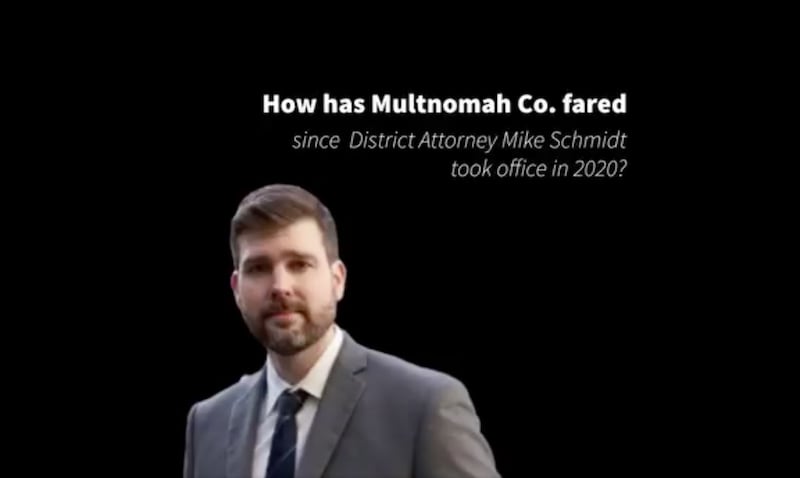Get ready for the onslaught. Between now and when ballots are counted May 21, candidates are going to fill your screens, your mailboxes, and your ears with the kind of propaganda that would make Vladimir Putin smile.
There’s no contest on the ballot nastier than the battle for control of the Multnomah County District Attorney’s Office. Challenger Nathan Vasquez, a two-decade veteran of the office, is trying unseat his boss, incumbent DA Mike Schmidt, who rode a national tide of criminal justice reform in 2020, only to get swamped under a massive uptick in crime, unruly employees, and the wallets of angry downtown business owners.
The ads both men have produced are rich in classic campaign tropes: grainy footage, ominous music, and an emphasis on each other’s least appealing features. Every image Schmidt uses of Vasquez, for example, shows the challenger with a goatee—a grooming style political consultants believe women dislike—while Vasquez’s own ads show him clean-shaven.
Vasquez has outraised Schmidt, $949,000 to $469,000, and holds an even more commanding advantage in cash on hand: $676,000 to $129,000. That doesn’t count the unquantifiable benefit of the rude billboards that the advocacy group People for Portland has bankrolled against Schmidt for more than a year—the group, a 501(c)(4) nonprofit, isn’t required to disclose its spending.
Both campaigns are tight-lipped about their media strategy between now and Election Day, but judging from the first ads they’ve placed into heavy rotation on social media, they won’t be offering you much context or nuance. Here are the stories behind the attacks.

THE CLAIM: In a 30-second ad, prominent on Facebook, the Vasquez campaign highlighted a KGW-TV story from November 2022 that found Schmidt’s office prosecuted misdemeanors at a far lower rate than adjoining counties did.
THE FULL STORY: The assertion relies on old news. A KGW follow-up in December 2023 found Multnomah County’s misdemeanor prosecution rate had risen to 82%—the same as Clackamas County’s, though still lower than Washington County’s rate of 94%.
Vasquez defends using the earlier KGW story, which obviously casts his opponent in a far worse light. “It’s important to note where Schmidt was before the press called him to account for his deficiencies,” Vasquez says. “I have no doubt that as the press reviewed his work and the election began to loom, he’s changed his tune.”
THE CLAIM: In the same ad, Vasquez implies that it’s Schmidt’s fault that the wheels of justice grind slowly, using a WW headline from Aug. 16, 2023: “Less Than Half of Criminal Cases in Multnomah County Circuit Court Are Resolved in a Timely Manner.”
THE FULL STORY: The claim ignores the fact that Multnomah County Circuit Court is run by judges who set trial dates and schedule pretrial hearings, motions and other court dates. Schmidt’s office obviously plays a central role in criminal court proceedings, but so do defense lawyers, whose availability is hamstrung by a well-publicized shortage of public defenders that has left more than 500 defendants unrepresented in Multnomah County alone.
Vasquez says he would treat the defense shortage like an emergency. “The elected DA has failed to lead and allowed cases to languish or be dismissed when there are other options on the table for leadership,” he says. “I would bring civil lawyers with prior experience in criminal defense work to arraignment court and request their appointment on appropriate cases, doing everything in my power to avoid dismissals for lack of defense attorneys.” Such a solution is speculative, however, with no funding.
THE CLAIM: The text that accompanies Vasquez’s main ad on Facebook says Schmidt “is being funded by the same out-of-state special interest groups that were behind Measure 110.”
THE FULL STORY: Campaign finance filings show Schmidt got $30,000 of the $468,000 he has raised from the Drug Policy Alliance, the New York nonprofit that funded Measure 110. (WW first reported on the donation in February.) That’s 6.4% of his total, and it appears to be the only institutional out-of-state contribution to Schmidt this cycle. “We were referring to the Drug Policy Alliance in the ad,” Vasquez acknowledges.
Perhaps more interesting is that Schmidt took the money and within a week jilted its spenders, testifying in Salem on behalf of recriminalization of drugs. “In Portland, we see open use of hard drugs on our streets—in front of our businesses, our parks, and our schools,” he testified Feb. 26. “We absolutely cannot continue to tolerate this.”

THE CLAIM: Schmidt’s flagship ad, a 30-second spot, appears on the splash page of a bluntly named website, rejectvasquez.com. In it, Schmidt’s campaign says Vasquez is backed by Betsy Johnson, a “machine gun-toting darling of GOP megadonors.” The narration is voiced over footage of a woman firing a submachine gun.
THE FULL STORY: Schmidt will take any opportunity to remind Portland voters that his opponent is a proud gun owner. Vasquez, who has had a concealed carry license, owns a 9 mm handgun, a rifle and a shotgun.
This, Schmidt calculates, won’t go over well with Portland voters, who voted overwhelmingly in support of a gun control measure in 2022. (Vasquez voted no on that measure, but says he objected to its implementation, not the premise behind it.)
So it’s useful for Schmidt to shift his attacks to one of Vasquez supporters: Johnson, the former longtime Oregon lawmaker whose opposition to gun control was a major issue during her failed campaign for governor in 2022. Her PAC has donated $9,000 to Vasquez’ campaign, less than 1% of the total he’s raised.
Johnson does own a machine gun, a collectible locked in a safe, but says she hasn’t shot one in over 25 years.
“The point is to show these aren’t self-defense or hunting weapons. They’re weapons of war and mass killing. People need to be really reminded of what’s at stake in the dialogue about guns in this country,” Schmidt campaign spokesman Andrew Rogers says.
THE CLAIM: Schmidt’s campaign materials loudly proclaim he’s a Democrat—implying that Vasquez isn’t.
THE FULL STORY: It’s true, Schmidt is indeed a Democrat—and Vasquez isn’t.
As in all county contests, district attorney is a nonpartisan office. But Schmidt’s spokesman calls his party affiliation “an important indicator of one’s values,” noting that Vasquez was registered Republican until 2017. Vasquez has said his disillusionment with the party coincided with the rise of Donald Trump.
Aligning with the Democratic Party in Multnomah County is a savvy move, where Democrats outnumber Republicans 5 to 1.
While Schmidt seems to be paying close attention to his party affiliation, Vasquez isn’t. In fact, his registration to vote as a member of the Independent Party in 2017 was apparently an accident. (It’s far more common for centrist voters to choose “nonaffiliated.”) “Nathan associates with the concept of an independent voter, not any particular party,” campaign spokeswoman Jessie Burke says.
THE CLAIM: In the same ad that features the machine gun, red text says Vasquez’s campaign is funded by “MAGA extremists.”
Schmidt’s campaign goes even further to try to link Vasquez to right-wing bogeymen in attacks published on a campaign website. These feature photos not only of Trump, but also “indicted Trump ally” Rudy Giuliani and shady figures clad in body armor, presumably a member of “the violent insurrectionist group the Proud Boys,” with what the website claims are “ties” to Vasquez’s funders.
THE FULL STORY: We asked Schmidt’s campaign who those funders were. Rogers pointed to three Vasquez donors who have also supported Trump’s campaign: timber company Freres Lumber, real estate developer Sam Allen, and Betsy Johnson’s husband, John Helm.
As for the insurrectionist ties: “Freres Lumber participated in a Timber Unity rally and even posted QAnon iconography on their blog,” Rogers says, and pointed to the fact, previously reported by WW, that a spokesperson of Timber Unity, a pro-logging advocacy group, was present at the U.S. Capitol on Jan. 6, 2021.
In fact, Vasquez has successfully led high-profile prosecutions of Proud Boy members, including Alan Swinney, who was sentenced to 10 years in prison in 2021, and Tusitala “Tiny” Toese, who got nearly eight years behind bars last year.


